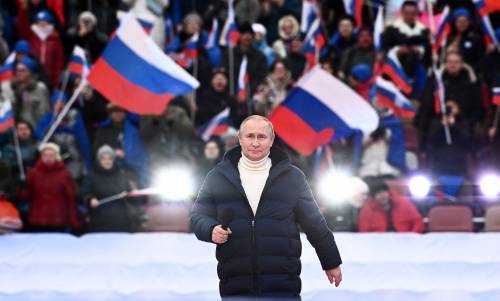
A trope that’s likely to die after the war in Ukraine is that Russian President Vladimir Putin is a “savvy genius.”
No matter how you look at Putin’s decision to invade Ukraine, it’s almost impossible not to see this conflict as a massive miscalculation on his part. Besides getting bogged down in a protracted war, he’s managed to unite the West, crater the Russian economy, fortify NATO, and solidify Ukraine’s national identity — the very thing he denied — by forcing the country to defend itself.
How did Putin get so many things wrong?
A recent article in the Atlantic by Brian Klaas, a politics professor at University College London and the author of Corruptible: Who Gets Power and How It Changes Us, argues that Putin has fallen into the “dictator trap.”
The short version is that dictators are often victims of the information bubbles they create around themselves. The sorts of errors that are easily avoidable in democratic systems (thanks to various checks) become commonplace in autocracies, and that leads to profound missteps by leaders.
I reached out to Klaas to dive into this a little more. We talk about how Putin exemplifies the dictator trap, why other autocratic leaders seem to avoid these mistakes, and why the deep dysfunction in American politics is producing a similar dynamic.
A lightly edited transcript of our conversation follows.
Sean Illing
How would you sum up the “dictator trap”?
Brian Klaas
It’s a mistake that dictators make where they become the victim of their own lies. To be more specific, it’s what happens when authoritarian leaders make catastrophic short-term errors because they start to believe in the fake realities they’ve constructed around themselves.
Sean Illing
Why do you think this is what has happened with Putin?
Brian Klaas
I started thinking about this because the invasion of Ukraine was such an obvious blunder and this was totally apparent to observers in the West. And Putin is someone who’s always been considered a savvy operator, so it was hard to understand how he could have made such an egregious mistake that could jeopardize his grip on power.
To my mind, it’s the story of 22 years of consolidating authority in a place where crossing the dictator is potentially a death sentence. Putin has been in charge for a very long time, and he’s grown increasingly impatient with people who cross him. The effect of getting increasingly isolated and increasingly repressive is that you get increasingly bad information. If independent media is shut down and you can’t freely discuss things, if people are afraid of telling pollsters what they actually think, if propaganda is so rooted in the regime’s survival that it becomes really what you believe to be true, you’re going to make massive mistakes.
I think what happened with Putin is basically the combination of being surrounded by yes-men and being surrounded by propaganda. When you have both of those things, and you’re trying to invade a country that people around you probably think will go badly but they’re afraid to say so, it’s understandable that eventually you start to think, “Maybe it’ll go really well,” because that’s all you’re hearing.
“When a significant chunk of people in your society no longer inhabit reality, you’re in trouble”
Sean Illing
Putin has held on to power for decades, despite all these potential pitfalls, so why now? What changed?
Brian Klaas
I think there’s two answers to that. The first one is that the effects compound over time. There’s this idea of “illusory control” that comes out of the literature on the psychology of power. It basically argues that the longer people are in positions of power, the more they start to believe that they can control outcomes that they can’t actually control. They start to believe that they can manipulate outcomes when they’re unable to do so.
These effects don’t necessarily manifest themselves in the early days of a dictatorship. In fact, dictators are often quite rational in the beginning. For example, jailing your opponents is a very rational thing to do when you’ve just seized power. It comes with a cost, however, and that cost doesn’t become clear until much later. I think that’s what’s happened with Putin.
The second argument that I’d make, and this comes from people who are more focused on Russia than I am, is that Putin has become increasingly isolated during the pandemic and therefore more cut off from criticism, and that’s never a good thing. In this case, I think he probably thought that the blowback here would be more or less like his invasion of Crimea in 2014, or like any of the other outlandish things he’s done in recent years, but he failed to consider that this was a different level of crime and one that would be treated very differently by the world.
Sean Illing
I’m not disagreeing with you at all, but I sometimes worry that dismissing Putin as drunk on his own disinformation might be too simple. Is it possible that he appears blinkered and irrational to us because he just doesn’t care about the things we care about, or the things we think he cares about?
Brian Klaas
I think that argument had some validity in the early days, before it became clear what the backlash was going to look like. It’s possible that Putin thought he could get away with this with a slap on the wrist. The reason I think it’s clear now that he believes his own lies is that it appears he’s still not getting good information about what’s happening. This is a real geopolitical pivot point that any rational actor would not wish on themselves, even a dictator, because it is plausible that he’ll lose power.
The other thing that I think is worth keeping in mind is that dictators may operate on different time horizons. They might have different objectives than us, and it’s completely right to look at the world through the eyes of the dictator to understand why they’re doing this. You’re completely right about that. But the problem is, even though the Russian people at the moment seemed to be supporting the war, you can’t feed people propaganda forever. At some point, when the economy collapses — and it’s going to collapse in a very big way for the ordinary Russian citizen — there is a serious risk of unrest.
I guess you could say there’s a plausible alternative hypothesis in which he simply miscalculated, because this was an unusual step for the West to take after they’d given him loads of slaps on the wrists in the past. But I think it’s much more plausible to believe that the way he’s talking about this, especially when you watch his speeches, is that he’s actually become less rational.
Sean Illing
Are dictators uniquely susceptible to this trap? It seems just as possible, if slightly less likely, in democratic systems where sycophancy and the incentives of power also operate.
Brian Klaas
I talk about this in the piece and I refer to an obvious case like Trump. We all know that Trump built a circle of advisers around him who were yes-men, and challenging Trump publicly was a one-way ticket out of the White House.
But the key difference is that the information environment outside of the White House was not authoritarian. In other words, Trump was obsessively watching CNN and MSNBC to see what people were saying about him. The New York Times and the Washington Post and others major papers were still investigating Trump and publishing stories about him, and journalists understood they could do that.
The information environment that a leader builds in any context can succumb to this dynamic. But if you’re operating in a broader authoritarian context, then there are no checks on that. That’s the worst of every world. It’s the perfect storm for dictators, because they insulate themselves from criticism internally. But then they also, as a result of their strategies to maintain power among the population, also remove criticism externally.
Sean Illing
China’s Xi Jinping seems to be avoiding the dictator trap. Is that because you don’t categorize him as a “dictator,” or is he some kind of outlier case?
Brian Klaas
There are a few things that are different about China. One is that there’s a much more effective bureaucracy in China, and it’s a much larger state in general than Russia.
The second thing is that they do actually do this. They experimented with this thing called “wolf warrior” diplomacy, where they were very aggressively going online and pushing propaganda and conspiracy theories in order to counter China’s critics. I think it backfired in a lot of ways, and there’s evidence that they may be dialing it back a bit. The point is that there are misunderstandings in the Chinese system as well.
The other thing that’s important is that the dictator trap is not about making miscalculations, which is something every leader in every system will do. It’s about making miscalculations that have no negative consequences, because you’ve insulated yourself from them. You can clearly see this happening with Putin.
There’s this myth that authoritarian regimes are more stable, and that’s partly because things often appear stable because it’s so dangerous to move against the dictator. They appear to be operating extremely intelligently, and then it blows up in their face. This is the kind of thing they might have seen coming had they had a safety valve like we do in the information environment of democracies.
“[T]he longer people are in positions of power, the more they start to believe that they can control outcomes that they can’t actually control”
Sean Illing
North Korea strikes me as a fascinating case study. I don’t think anyone alive right now lives in a more hermetically sealed bubble than Kim Jong Un, so how do you explain that? How has he managed to survive for so long in such a closed system?
Brian Klaas
Kim Jong Un is a great example of the sorts of information bubbles we’re talking about, but there’s something else we haven’t talked about yet. He’s the poster child for a cult of personality.
One of the loyalty tests I talk about in the piece is when leaders force people to prove their loyalty to the regime by lying on behalf of it. The sooner that a lie gets accepted by the broader population, the less the loyalty test is effective, because everybody accepts it. Therefore, a more extreme loyalty test gets created. This has happened in the Kim dynasty for decades. That’s why they have such absurd claims about him inventing hamburgers or getting 18 holes in one in a golf game.
But the other thing I’d say is that you can overcome some of these risks in a fully totalitarian state by using extreme violence and repression, but even that has limits. I prefer to use the word “despot” to describe someone like Kim Jong Un. Putin is not a totalitarian dictator in the same way that Kim is, because he still has some structures around him that aren’t really democratic but they still have a veneer of democratic legitimacy. If you go full totalitarian like Kim Jong Un, then you can maybe control the population so completely that the miscalculations don’t matter as much.
The most susceptible authoritarian leaders are the ones who are not willing to simply crush their society completely. The dystopian truth about North Korea’s regime is that it has avoided downfall precisely because it is so horrific.
Sean Illing
I’ve been working on a book that makes an inverse argument about democratic systems. Democracies contain the seeds of their own destruction in the sense that their openness unleashes forces that often undermine the very freedom on which they depend, and you’re saying that closed totalitarian systems also implode from within precisely because they’re too closed. I’m curious what, if anything, you make of that?
Brian Klaas
Oh, that’s interesting. The unifying thread is that it’s really important to have a shared sense of reality in any political system. What’s happened to Putin is that he’s succumbed to a fake reality that he himself created, and then he’s had that reality mirrored back at him by people who are afraid to tell him the truth.
In the United States, for example, you have people who find it politically advantageous to lie about the world. Many of these people understand what’s actually happening, but they also find that it’s in their political self-interest to construct and parrot this fake reality back to their own base who believes it.
But I do think you’re hitting on a parallel in the US. Because we no longer agree about what’s real and what’s not, we are dysfunctional. We have people shooting up pizzerias because they believe that there are children in the basement. That’s somebody who’s miscalculating based on a belief in a fake reality. It’s a similar dynamic.
The difference is that our leadership exists in a broader information sphere that is more reflective of reality and does provide checks on those things. When QAnon becomes popular, we have loads of people who start debunking QAnon. It doesn’t get through to everybody, but at least it exists.
The main parallel is that when a significant chunk of people in your society no longer inhabit reality, you’re in trouble. You’re particularly in trouble when people in elected office or in power no longer inhabit reality. I think in that situation, I’d still rather be in a democracy than a dictatorship, but it’s still truly worrying that it’s happening in a democracy.
Sean Illing
As would I, but since democracies do have some of these same vulnerabilities, what institutional guardrails do we need to ensure we avoid this trap?
Brian Klaas
The overall majority of House seats in the US are either gerrymandered or noncompetitive just based on demographics. So the primary system creates mass incentives for extremism. When you put that in combination with the splintered media environment, you’ve got a major problem.
Marjorie Taylor Greene shows these problems in spades. You say things that are unhinged and you become a darling on Twitter. You break out as a star, everybody in the party knows who you are, and Mitch McConnell can’t do anything about it. I think you have to make it so there are institutional incentives to tell the truth and to also be more interested in making policy than having a viral tweet that trolls the libs or whatever.
I think the big point here is that we also have to think about turning the mirror back on ourselves. This is something that I’ve observed living in the UK for the last 10 years. There’s something deeply dysfunctional about American society right now. People are financially and electorally rewarded for lying to their voters. We can come up with every possible institutional change that you can imagine to revive our democracy, but nothing will matter unless we solve this problem with our society.
Will you support Vox’s explanatory journalism?
Millions turn to Vox to understand what’s happening in the news. Our mission has never been more vital than it is in this moment: to empower through understanding. Financial contributions from our readers are a critical part of supporting our resource-intensive work and help us keep our journalism free for all. Please consider making a contribution to Vox today.
Sourse: vox.com






